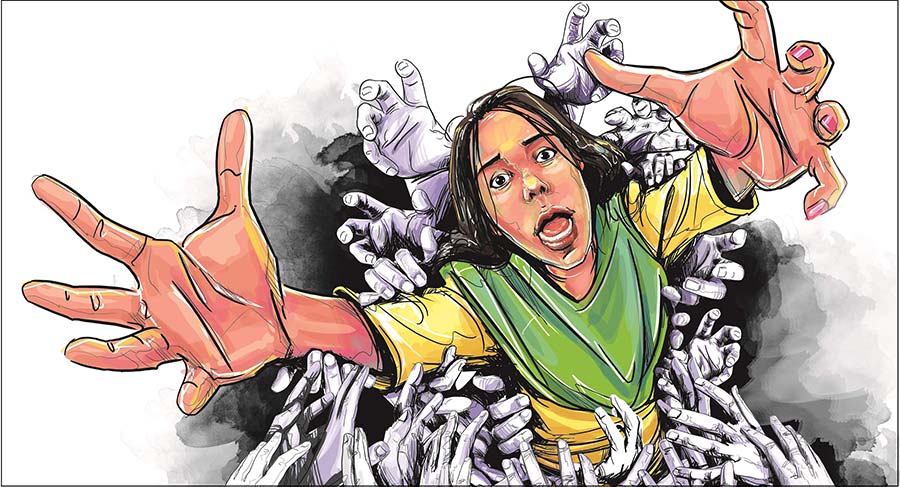by Fayaz Ahmad Paul
Intimate partner violence is defined as physical or sexual violence, emotional abuse and stalking. It is typically experienced by women of all ages and represents the leading cause of homicide death for women. It can be also experienced in about one-third of men at a lower severity.

Subjects who have undergone intimate partner violence are at increased risk of multiple mental health conditions like mood disorders, anxiety disorders, eating disorders, post-traumatic stress disorder, substance or alcohol abuse and physical health conditions cardiovascular disease, chronic pain, sleep disturbances, gastrointestinal problems, sexually transmitted infections, and traumatic brain injury.
It has outlined that children and adolescents’ exposure to violence by adults within the family, either through witnessing or victimization is detrimental to mental and physical health and can be associated with anxiety, depression, eating disorders, substance use and smoking, self-harm or suicidal ideation and poorer general health. Besides, young people exposed to parental violence are more likely victims of bullyism or cyber-bullyism and less likely seek professional help.
In general exposure to family, violence increases an individual’s risk for perpetrating violence in his own future relationships or developing other deleterious mental and behavioural health outcomes. Early-life maltreatment, abuse or neglect seem to be the entrance door of poor emotion regulation, increased avoidance, emotional suppression, and expression of negative emotions in response to stress.
In other words, an abused child is potentially an abusator in adulthood, in a trans-generational reproduction of violence. The risk of victimization and perpetration of family violence frequently occurs among persons with psychiatric disorders and the co-occurrence of intimate partner violence with other parental problems, such as mental health or substance abuse, significantly compromise both mothers’ and fathers’ parenting and makes very difficult to adequately meet the children’s needs.
The Coronavirus pandemic has radically changed the lives of individuals. The stringent measures to contain and manage the epidemiological emergency have undoubtedly subjected the structure of families to some critical issues and tensions and it is not known how long it will last.
During quarantine due to the pandemic, home risks to become a very dangerous place for victims of domestic violence, because they are required to stay the whole day with partners and away from people who can validate their experiences and give help. For those who live in small houses or without open spaces, the change in stress is exacerbated. Nor can the help of grandparents be used, given the invitation to keep elderly people at home and well away.
Everyone is experimenting with new ways of relating to others. Abusive situations can further deteriorate due to economic crisis linked to pandemic emergence (many victims have difficulty to leave abusive partners for economic reasons), and isolation can exacerbate difficult situations and possible growth of domestic homicides or murder-suicides or deviant behaviours towards children due to difficulties in managing parental stress. The presence of children and adolescents at home due to school closed during quarantine also worsens the exposure of young subjects to domestic violence with direct consequences to their mental and physical health.
In feeling threatened, aggression arises, the need to feel alive and real sometimes leads to being unconsciously ruthless, to prevaricate and destroy the other, triggering a dangerous circle of agitated aggression, frustrating response, claim or an overwhelming sense of guilt for the destruction: these dynamics can often result in scenarios of destructive aggression and possible trans-generational transmission of trauma and violence.
Especially during quarantine around the world, there is a need for programs of funding sources to guarantee telephone or remote counselling services with high-speed internet, hotlines, and emergence shelters. It is important to forecast screening tools possibly aimed to the prevention of acts of domestic violence, accurate assessment of multiple domains of abuse (psychological, physical, sexual) validated both on women and men and effective interventions provided by trained multidisciplinary staff including psychiatrists, psychiatric social workers, psychologists, social and legal services in a network to manage and attempt to prevent crisis situations. It is also mandatory to identify high-risk individuals in order to avoid the occurrence of extreme events such as impulsive acts, homicide or suicide. It has already been outlined the effectiveness of online safety and health interventions for different needs of women who have experienced intimate partner violence.

Fayaz Ahmad Paul
Violence against women represents a key priority in achieving gender equality around the world. Family members living in complex social and psychological situations risk to spend the forced lock-down subjected to media overexposure with increasing levels of stress and fear, often subjected to humiliations that can be massive and lashing or progressive, unapparent and based on cumulative micro traumas.
The role of mental health professionals would be to avoid people remain in this emotional desert and in this time of pain by soliciting inner listening and dialogue for the rediscovery of what unifies with others in anxieties and concerns, but also in expectations and hopes.
(Author is a research scholar in the Psychiatric Social Work, stream at the Department of Psychiatry, Government Medical College and Hospital in Srinagar. The opinions expressed in this article are those of the author’s and do not purport to reflect the opinions or views of Kashmir Life.)
from Kashmir Life https://ift.tt/3cJP1nI
via IFTTThttps://kashmirlife.net
No comments:
Post a Comment